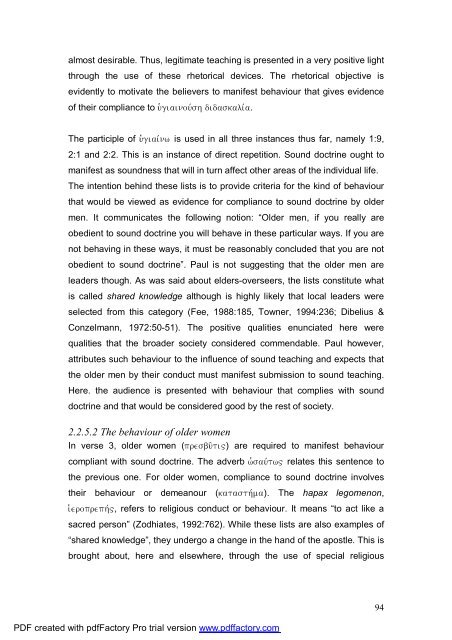A Text centred rhetorical analysis of Paul's Letter to Titus
A Text centred rhetorical analysis of Paul's Letter to Titus
A Text centred rhetorical analysis of Paul's Letter to Titus
You also want an ePaper? Increase the reach of your titles
YUMPU automatically turns print PDFs into web optimized ePapers that Google loves.
almost desirable. Thus, legitimate teaching is presented in a very positive light<br />
through the use <strong>of</strong> these <strong>rhe<strong>to</strong>rical</strong> devices. The <strong>rhe<strong>to</strong>rical</strong> objective is<br />
evidently <strong>to</strong> motivate the believers <strong>to</strong> manifest behaviour that gives evidence<br />
<strong>of</strong> their compliance <strong>to</strong> uJgiainouvsh didaskaliva.<br />
The participle <strong>of</strong> uJgiaivnw is used in all three instances thus far, namely 1:9,<br />
2:1 and 2:2. This is an instance <strong>of</strong> direct repetition. Sound doctrine ought <strong>to</strong><br />
manifest as soundness that will in turn affect other areas <strong>of</strong> the individual life.<br />
The intention behind these lists is <strong>to</strong> provide criteria for the kind <strong>of</strong> behaviour<br />
that would be viewed as evidence for compliance <strong>to</strong> sound doctrine by older<br />
men. It communicates the following notion: “Older men, if you really are<br />
obedient <strong>to</strong> sound doctrine you will behave in these particular ways. If you are<br />
not behaving in these ways, it must be reasonably concluded that you are not<br />
obedient <strong>to</strong> sound doctrine”. Paul is not suggesting that the older men are<br />
leaders though. As was said about elders-overseers, the lists constitute what<br />
is called shared knowledge although is highly likely that local leaders were<br />
selected from this category (Fee, 1988:185, Towner, 1994:236; Dibelius &<br />
Conzelmann, 1972:50-51). The positive qualities enunciated here were<br />
qualities that the broader society considered commendable. Paul however,<br />
attributes such behaviour <strong>to</strong> the influence <strong>of</strong> sound teaching and expects that<br />
the older men by their conduct must manifest submission <strong>to</strong> sound teaching.<br />
Here. the audience is presented with behaviour that complies with sound<br />
doctrine and that would be considered good by the rest <strong>of</strong> society.<br />
2.2.5.2 The behaviour <strong>of</strong> older women<br />
In verse 3, older women (presbu`ti") are required <strong>to</strong> manifest behaviour<br />
compliant with sound doctrine. The adverb wJsauvtw" relates this sentence <strong>to</strong><br />
the previous one. For older women, compliance <strong>to</strong> sound doctrine involves<br />
their behaviour or demeanour (katasthvma). The hapax legomenon,<br />
iJeroprephv~, refers <strong>to</strong> religious conduct or behaviour. It means “<strong>to</strong> act like a<br />
sacred person” (Zodhiates, 1992:762). While these lists are also examples <strong>of</strong><br />
“shared knowledge”, they undergo a change in the hand <strong>of</strong> the apostle. This is<br />
brought about, here and elsewhere, through the use <strong>of</strong> special religious<br />
PDF created with pdfFac<strong>to</strong>ry Pro trial version www.pdffac<strong>to</strong>ry.com<br />
94

















